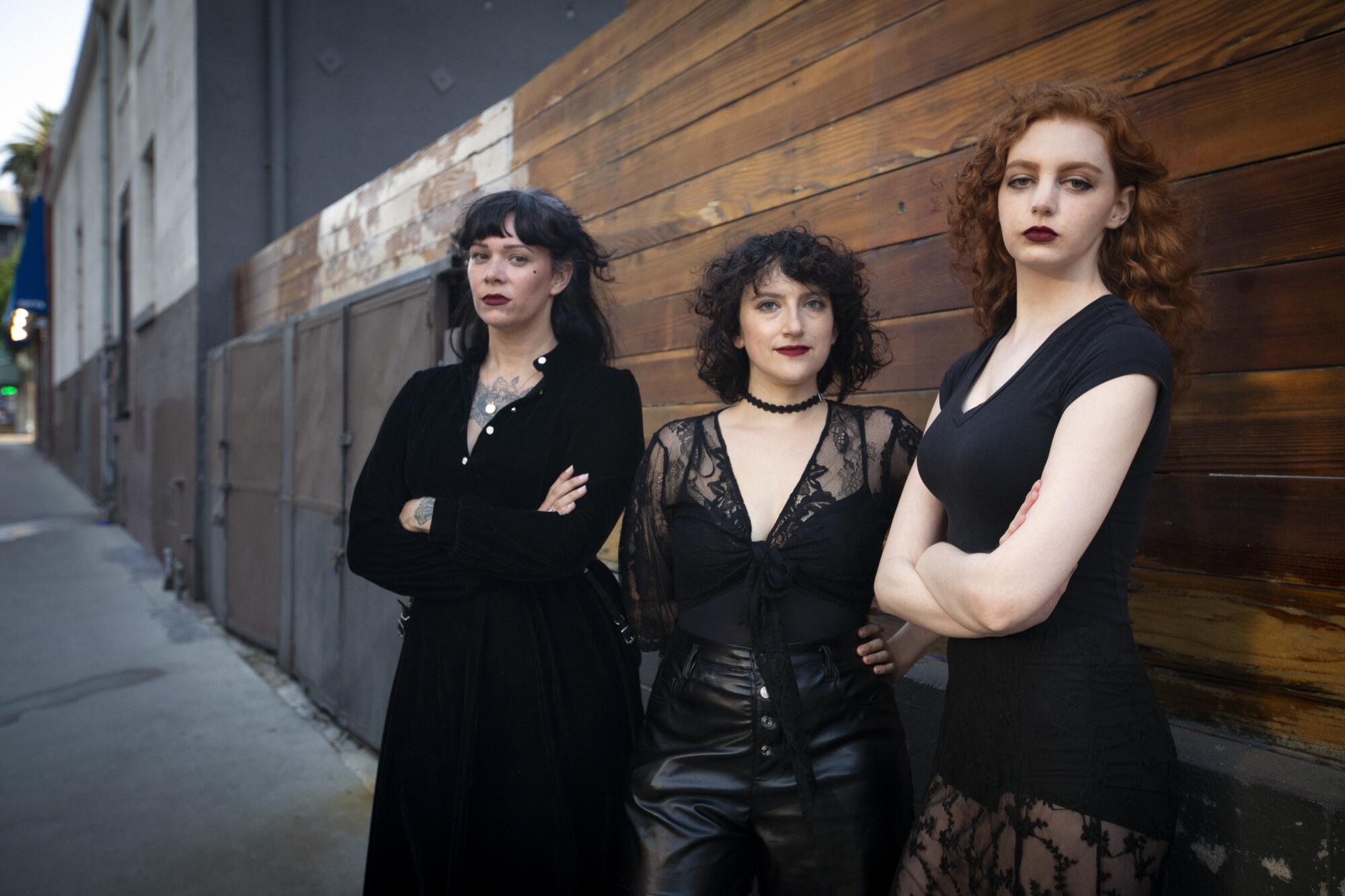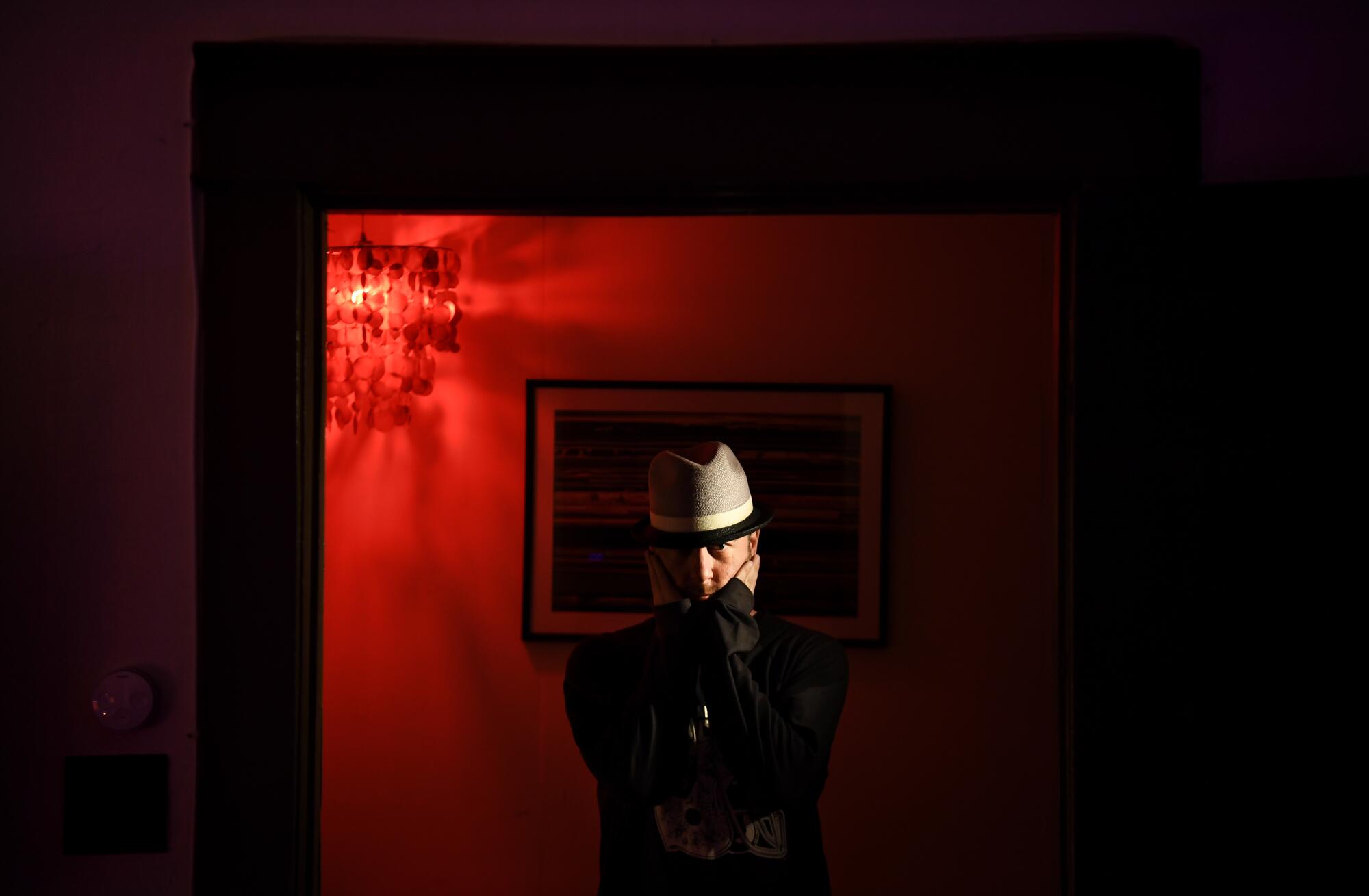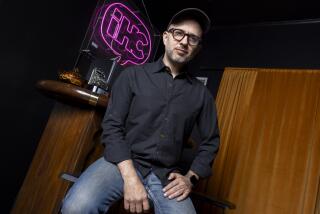
- Share via
Hannah Harding parted a thick wooden gate and walked into the barely lit labyrinth of the Hollywood club Cloak & Dagger on Oct. 22, 2019.
An evening at the Goth club, where a cast of experimental artists performed eerie, sexually charged ceremonies each week in the back rooms of the Pig ’N Whistle bar, was a coveted invitation: an uninhibited, LGBTQ-friendly, members-only club where underground DJs, actors, rockers and adventurous partygoers could revel in safety and secrecy.
For the record:
12:20 p.m. March 23, 2021This article says Tiffany Naiman is a UCLA professor and music industry consultant who worked part time with Cloak & Dagger. She is a UCLA lecturer who consulted with the club about marketing. It also says she hosted a Zoom meeting with Cloak & Dagger co-founders Adam Bravin and Michael Patterson for longtime members. She attended the meeting but did not host.
The scene felt a little spooky, but that was part of the appeal for the then-21-year-old.
As the party ramped up in the main “black room,” actor Thomas Middleditch, best known for his role as Richard Hendricks on the HBO series “Silicon Valley,” approached Harding on the dance floor, she said. He’d met Harding at the club before. Staff had brought concerns about his behavior to co-founders Adam Bravin and Michael Patterson.
Harding said Middleditch made lewd sexual overtures toward her and her girlfriend. She turned him down, but he kept pursuing her, groping her in front of her friends and several employees, including the club’s operations manager, Kate Morgan.
Morgan said she asked her bosses to kick Middleditch out and ban him, but they didn’t seem to take it seriously.
“I felt like they dismissed it,” she said. “I told Adam that he needed to listen, that this was not OK.”
Harding has Instagram direct messages from Middleditch, seen by The Times, saying, “Hannah I had no idea my actions were that weird for you ... I know you probably want to just put me on blast as a monster ... I don’t expect you to want to be my friend or anything ... I am so ashamed I made you uncomfortable.”
A representative for Middleditch declined a request for comment.
Ten women, including four former employees, told The Times that Bravin and Patterson — prominent artists in L.A.’s rock and electronic music scenes — ignored sexual misconduct among members at Cloak and at its festivals. They allege that the owners took cover under the club’s secrecy and boundary-pushing aesthetic, until a Zoom call in June, when members unloaded on Bravin and Patterson about how they’d been treated.
Some staff and regulars said Cloak used its Goth allure as a front.
“Michael said he wanted to have a ‘real cult,’” Morgan, 37, said of her three years working at the club. “We all felt complicit but realized we’d been duped as well.”
In an email, Patterson wrote that he did not recall saying that.
“My goal for Cloak & Dagger was to create an atmosphere that would inspire people to be their best and most creative self,” he wrote.
“Our goal from day one was to create the safest space possible,” Bravin said by email, adding that the founders relied on trusted volunteers and members to “keep an eye out over their community and be a conduit to management or security.”
Harding said that after she complained, she saw Middleditch grope another woman in the club. She said Bravin did reach out a week later, only to tell her she must have been mistaken about the incident.
“Adam called me ‘to make sure and get a second opinion on him’ because they didn’t trust my story in the first place. They cared more about famous people at their club than women’s safety,” Harding said.

When Cloak opened in 2015, Bravin and Patterson tried to re-create the mystique of L.A.’s Goth scene of the 1980s, when bands like Christian Death and 45 Grave forged a darkness-amid-the-sunshine aesthetic, fetishizing decayed Old Hollywood glamour.
Bravin, of the electro-rock duo She Wants Revenge, and Patterson, a Grammy-nominated producer, were veterans of L.A.’s music scene. She Wants Revenge played Coachella, and Patterson worked on the Oscar-winning score for “The Social Network.”
L.A.’s contemporary Goth scene is diffuse, spans generations and stays largely underground. Fifty-year-old industrial-music producers mingle with early-20s OnlyFans fetish models at warehouse techno parties and private clubs for bondage, dominance, sadism and masochism, or BDSM, across downtown and Hollywood. Until the COVID-19 pandemic, Cloak was thriving: Diplo often stopped by to DJ, and the club expanded to hold events in Chicago and Mexico City and a large music festival in downtown L.A.
Libertinism was an accepted part of the culture, though the scene has begun reckoning with sexual abuse accusations against Goth’s most famous figure, Marilyn Manson.
Lines between denizens’ work, social scenes and personal lives were often hazy.
“When I started at Cloak, I was living with an abusive boyfriend,” recounted one female staffer, who guided guests through the club’s staged rituals. (She asked for anonymity, fearing attacks in her professional life.) “I was vulnerable. [Bravin] and I slept together a few times, and he offered to hook me up with movie roles or to jam with She Wants Revenge.”
Those hopes never materialized. “When it went sour with us, it definitely affected the work environment,” she said. “I’d come to work, and he wouldn’t speak to me.”
Bravin and Patterson personally scouted members, who were welcomed with a robed initiation ritual. The dress code was all black — no exceptions. A tattoo artist inked regulars (and employees like Morgan) with the club’s abstracted knife logo. Photos were banned, and guests were sworn to silence about what happened inside.
“Don’t go anywhere uninvited,” staff instructed guests upon entry. “If you speak of anything you have seen or heard here, you will lose [your membership]. If you see or hear anyone else speaking of what they saw or heard, let us know. Do you understand?”
Annie Lesser, 32, an L.A. playwright and theater producer, composed Cloak’s scripted elements, such as initiation rituals at which guests chose totemic objects or received three ink dots under their eye.
“By letting us mark you, you were giving us your trust and power. It was all designed around that dynamic,” Lesser said. “People had an emotional attachment to it in a way you couldn’t do with a normal club.”
Cloak had occasionally expelled members, including high-profile ones like the screenwriter Max Landis, who was accused of sexual abuse by multiple women in 2019 (though not at the club). Landis did not return requests for comment.
But Cloak’s strict codes of silence seemed to insulate those accused of harming women, staff and members said.
Elisabeth — a 29-year-old who asked that her last name not be used, for fear of reprisals — said a prominent Cloak member sexually assaulted her at his apartment in October 2018.
“It took me having to scream for him to get off of me,” she said.
She told her story to a close friend, an actress who performed at Cloak. Days later, the actress and Morgan confronted the man inside the club. The actress (who also asked for anonymity, fearing professional consequences) said Bravin called her days later, furious.
“I was banned for a month, which shocked me,” she said. “I thought the goal was to create a safe space.”
Bravin later called that actress into a company meeting at which Elisabeth’s alleged assailant was present.
“Michael and Adam were furious with her,” Morgan recalled. “They suspended her, apologized to the member and said to move on.”
Asked about the incident, Bravin said, “I spoke with the [accused] member the following day, and he gave his account of a consensual experience.” Elisabeth said Bravin did not reach out to her.
Cloak’s membership was tightly vetted and curated for celebrity and influence. Some of the several thousand members were allowed to join for free; others paid $100 a month, which gave them access to private social media groups and more secluded areas of the club, a haven for elite members of L.A.’s kink scene and electronic-music underground.
Guests often came dressed in BDSM leather, lingerie or less. The performances and scenery changed week to week — candlelit tarot sessions, avant-garde dance recitals, sensory-deprivation play. Although it wasn’t branded as a sex club, members had “safe words” on file if any of the bondage play, ritual performances or casual hookups got too intense.
The club did foster strong emotional connections, especially during the pagan-inspired rituals at which guests would unburden their troubles to staff.
“I felt like I finally found people who didn’t think I was weird and celebrated what I believed in,” said the ritual guide. “I had plenty of experiences where people would go through the rituals and be bawling by the end.”
Sometimes the rituals were vaguely menacing, including one in which a group of actors threatened members if they ever “betrayed” Cloak’s strictures. But Bravin balanced the occult imagery with Facebook and Instagram posts assuring fans that the club’s sense of freedom was rigorously guarded.
“If any members ever see a member or a guest of a member being rude, aggressive, invading personal space, taking photos/video, breaking rules, anything out of line, immediately inform [us] so we can handle it immediately,” he wrote in a February 2018 Facebook post.
But employees and guests said Bravin used his position as a gatekeeper to pressure members and employees into tense encounters.
“Adam flirted with almost every female employee, either asked them out directly or sent flirty messages at 2 a.m.,” Lesser said. “We organized a [separate] Zoom meeting for former employees where someone said, ‘Raise your hand if you’ve been hit on by Adam and Michael.’” The vast majority raised their hands, Lesser said; other employees recalled the meeting similarly.
That went for members, too. Bravin “hit on me straight away, and he’d use the same methods and lines to all my friends: ‘Oh, you inspired my set tonight.’ We were all rolling our eyes, but there was pressure to be like, ‘Thanks,’” said member Alison Waxman, 28. “He was the owner; you had to play nice and placate him.”
Unwanted attention from Bravin made members nervous to come to him to report other incidents. One night, Waxman said, two men she didn’t know sneaked up behind her on Cloak’s dance floor, grabbed her by the hair and tried to drag her away from the crowd.
“Of course we were all afraid of speaking up” to Bravin and Patterson, she said.
Bravin told The Times that “as a result of my unconscionable ignorance to an existing power dynamic between me as part-owner of Cloak & Dagger and the members, I came to understand how my flirtatious communication could have been inappropriate and unacceptable.”
Former employees also said Bravin and Patterson cut corners with safety.
“Everybody working under them really did want to keep the place safe,” Morgan said. “But they had all the power, and every decision was run past them. We were never empowered to actually solve things. The buck stopped with them, and [safety] was not their intent.”
Lesser, who worked for the club either full or part time from its 2015 inception through 2020, said she was physically attacked by a venue owner at one of Cloak’s festivals.
“He grabbed me and dragged me out of a back room and said, ‘I can touch whoever I want.’ I was very shaken and told Michael and Adam, and they said, ‘We’ll deal with it,’ but all I got was a half-assed apology, and they said, ‘So now we’re all good.’”
While the Pig ’N Whistle employed a professional security guard in the main bar and had a doorman to handle Cloak & Dagger’s entrance, staffers said the bar left the Goth club more or less on its own.
For security, Cloak largely relied on volunteer members, who wore red lapel pins and were portrayed on social media as trusted figures to seek out if members felt unsafe. But they were mostly friends of the owners, with no security training. Some took their roles seriously, but the confusion about who, exactly, was in charge made it difficult to deal with misconduct.
“When people came to them with safety concerns,” Morgan said, “they just weren’t equipped to handle it.” Former members used phrases like “completely gaslit,” “very uncomfortable” and feeling “totally crazy” in describing their experiences reporting misconduct.
Patterson said, “As far as I am aware, they reported every incident to us, and to my knowledge, we dealt with every single issue brought to our attention.”
COVID-19 shuttered Cloak & Dagger in March 2020, though the club continued to livestream DJ sets. The simmering issues around harassment soon collided with the club’s response to the Black Lives Matter protests.
Vanessa Benton, a 27-year-old Black member, was angry that an ostensibly progressive nightclub was doing so little to help with the cause.
“We were out in the streets protesting and then got an email saying, ‘Come party,’” she said. “I came at them respectfully, saying, ‘I’m a Black member, and it’s disturbing that you haven’t said anything yet.’”
Amid more criticism, Bravin, Patterson and Tiffany Naiman, a UCLA professor and music-industry consultant who worked part time with the club, hosted a Zoom call for longtime members on June 23, 2020. According to several who participated, the call fell apart when Waxman told Bravin, as dozens of assembled members listened on, that “you need to stop hitting on every woman who comes in. We don’t like it, we’re half your age, it’s inappropriate.”
“I was totally surprised and offended,” said Craig Klein, a theater and nightlife executive who was on the call. “I reached out to everybody I worked with in nightlife immediately to tell them to avoid Cloak. I was livid.”
After the call, in an angst-filled message on Instagram, Bravin wrote: “My behavior was inappropriate and unacceptable,” adding that he was “also educating myself on why and how my behavior could be harmful and emotionally manipulative.”
Shortly after being contacted by The Times in January about Cloak & Dagger’s alleged toxic atmosphere, Bravin and Patterson announced that the club was closing permanently and deleted all their social media content.
“Thank you for your business and support over the years. We wish you the best,” they said in a brief statement to members.
Rather than cover up her Cloak & Dagger knife tattoo, Morgan decided to keep it as a reminder of what she hoped the club could be and as a tribute to the friends she found there, in spite of everything that happened in those dimly lit rooms.
“It was like putting someone under a spell,” Morgan said. “Once you believe somebody is magical and they care about you, it’s so hard to undo that.”
More to Read
The biggest entertainment stories
Get our big stories about Hollywood, film, television, music, arts, culture and more right in your inbox as soon as they publish.
You may occasionally receive promotional content from the Los Angeles Times.











